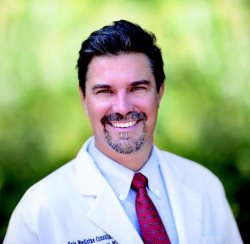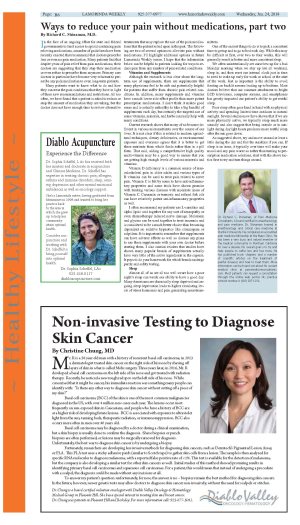| | Published January 24th, 2018
| Ways to reduce your pain without medications, part two
| | | By Richard C. Shinaman, M.D. |  | | Dr. Richard C. Shinaman, of Pain Medicine Consultants, is board certified in anesthesiology and pain medicine. Dr. Shinaman trained in anesthesiology and critical care medicine at Stanford University. He completed an accredited pain medicine fellowship at the Mayo Clinic. He has been a very busy and valued member of the medical community in Northern California for over a decade. His overall goal is to try and help people to suffer less and live more. He has published book chapters and a number of scientific articles on the treatment of painful diseases and how to treat them. More information can be found out about his current medical clinic at painmedicineconsultants.com. Most patients can request a consultation through the online web portal. His practice contact number is (925) 287-1256. |
In the face of an ongoing effort for state and federal governments to limit access to opioid containing pain relieving medications, a number of guidelines have been recently enacted that recommend that doctors prescribe less or even no pain medication. Many patients find that despite years of pain relief from pain medications, their doctors are suggesting that they stop their medication or even refuse to prescribe them anymore. Primary care doctors in particular have become very reluctant to prescribe any pain medication to even long-term patients.
 Many patients want to know what to do and how they can treat the pain conditions that they have in light of these new recommendations and restrictions. All too often, we have found that a patient is asked to reduce or stop the amount of medication they are taking, but the doctor does not have enough time to review alternative treatments that may replace the use of the pain medications that the patient relied upon in the past. The following are two of several options to alleviate pain without medications. I'll highlight additional options in future Lamorinda Weekly issues. I hope that the information below can be helpful to patients looking for ways to reduce pain from any number of pain-related conditions.
Many patients want to know what to do and how they can treat the pain conditions that they have in light of these new recommendations and restrictions. All too often, we have found that a patient is asked to reduce or stop the amount of medication they are taking, but the doctor does not have enough time to review alternative treatments that may replace the use of the pain medications that the patient relied upon in the past. The following are two of several options to alleviate pain without medications. I'll highlight additional options in future Lamorinda Weekly issues. I hope that the information below can be helpful to patients looking for ways to reduce pain from any number of pain-related conditions.
 Vitamins and Supplements
Vitamins and Supplements
 Although the research is less clear about the long-term use of supplements, there are supplements that many physicians feel to be safe and potentially helpful for patients that suffer from chronic pain related conditions. In addition, many supplements and vitamins have a much lower side effect profile than more potent prescription medications. I don't think it makes good sense and is actually unhealthy to take a big handful of supplements each day, but certainly the targeted use of some vitamins, minerals, and herbs can really help with many conditions.
Although the research is less clear about the long-term use of supplements, there are supplements that many physicians feel to be safe and potentially helpful for patients that suffer from chronic pain related conditions. In addition, many supplements and vitamins have a much lower side effect profile than more potent prescription medications. I don't think it makes good sense and is actually unhealthy to take a big handful of supplements each day, but certainly the targeted use of some vitamins, minerals, and herbs can really help with many conditions.
 Current research shows that many of us become deficient in various micronutrients over the course of our lives. It is not clear if this is related to modern agricultural techniques, dietary deficiencies, or environmental exposure and everyone agrees that it is better to get these nutrients from whole foods rather than in a pill form. That said, adding a comprehensive high quality multi-vitamin may be a good way to ensure that you are getting high enough levels of various minerals and vitamins.
Current research shows that many of us become deficient in various micronutrients over the course of our lives. It is not clear if this is related to modern agricultural techniques, dietary deficiencies, or environmental exposure and everyone agrees that it is better to get these nutrients from whole foods rather than in a pill form. That said, adding a comprehensive high quality multi-vitamin may be a good way to ensure that you are getting high enough levels of various minerals and vitamins.
 Vitamin D deficiency is a common source of musculoskeletal pain in older adults and various types of B vitamins can be used to treat pain related to nerve pain. Vitamin C is felt by some to have anti-inflammatory properties and some trials have shown promise with treating various diseases with moderate doses of Vitamin C. Curcumin or turmeric and refined fish oils can have relatively potent ant-inflammatory properties as well.
Vitamin D deficiency is a common source of musculoskeletal pain in older adults and various types of B vitamins can be used to treat pain related to nerve pain. Vitamin C is felt by some to have anti-inflammatory properties and some trials have shown promise with treating various diseases with moderate doses of Vitamin C. Curcumin or turmeric and refined fish oils can have relatively potent ant-inflammatory properties as well.
 I often recommend my patients use L-carnitine and alpha lipoic acid together for any sort of neuropathy or even chemotherapy induced nerve damage. Melatonin and glycine can be used together to treat insomnia and is considered to be a much better choice than becoming dependent on sedative hypnotics like clonazepam or zolpidem. It is important to remember that supplements can have adverse effects as well so discuss any plans to use these supplements with your own doctor before starting them. I also caution readers that studies have shown many popular brands of supplements actually have very little of the active ingredients in the capsule. It pays to do your homework for which brands undergo purity and safety testing.
I often recommend my patients use L-carnitine and alpha lipoic acid together for any sort of neuropathy or even chemotherapy induced nerve damage. Melatonin and glycine can be used together to treat insomnia and is considered to be a much better choice than becoming dependent on sedative hypnotics like clonazepam or zolpidem. It is important to remember that supplements can have adverse effects as well so discuss any plans to use these supplements with your own doctor before starting them. I also caution readers that studies have shown many popular brands of supplements actually have very little of the active ingredients in the capsule. It pays to do your homework for which brands undergo purity and safety testing.
 Sleep
Sleep
 Almost all of us are all too well aware how a poor night's sleep can wreck our ability to have a good day. Many Americans are chronically sleep deprived and ongoing sleep deprivation leads to higher circulating levels of stress hormones and pain generating neurotransmitters.
Almost all of us are all too well aware how a poor night's sleep can wreck our ability to have a good day. Many Americans are chronically sleep deprived and ongoing sleep deprivation leads to higher circulating levels of stress hormones and pain generating neurotransmitters.
 One of the easiest things to do is to pick a consistent time to get up and to go to bed each day. While this may be difficult at first, over two to four weeks, this will generally result in better and more consistent sleep.
One of the easiest things to do is to pick a consistent time to get up and to go to bed each day. While this may be difficult at first, over two to four weeks, this will generally result in better and more consistent sleep.
 We often unintentionally set ourselves up for a bad Monday morning when we stay up late all weekend, sleep in, and then reset our internal clock just in time to need to wake up early for work or school at the start of the week. Just as important is the ability to avoid fixating on backlit screens leading up to bedtime. Most doctors believe that our constant attachment to bright LCD televisions, computer screens, and smartphones has greatly impacted our patient's ability to get restful sleep.
We often unintentionally set ourselves up for a bad Monday morning when we stay up late all weekend, sleep in, and then reset our internal clock just in time to need to wake up early for work or school at the start of the week. Just as important is the ability to avoid fixating on backlit screens leading up to bedtime. Most doctors believe that our constant attachment to bright LCD televisions, computer screens, and smartphones has greatly impacted our patient's ability to get restful sleep.
 Poor sleep often goes hand in hand with no physical activity and spending limited time outdoors in natural sunlight. Several studies now have shown that if we are more physically active, we typically sleep much more soundly and also suggest that being outside or in sunlight during daylight hours produces more restful sleep after the sun goes down.
Poor sleep often goes hand in hand with no physical activity and spending limited time outdoors in natural sunlight. Several studies now have shown that if we are more physically active, we typically sleep much more soundly and also suggest that being outside or in sunlight during daylight hours produces more restful sleep after the sun goes down.
 As suggested above, try and move around at least a little during the day and feel the sunshine if you can. If sleep is an issue, it typically over time will make your mood and any pain worse so rather than turning to prescription medication solutions, start with the above tactics first to try and turn things around.
As suggested above, try and move around at least a little during the day and feel the sunshine if you can. If sleep is an issue, it typically over time will make your mood and any pain worse so rather than turning to prescription medication solutions, start with the above tactics first to try and turn things around.


|
| | | | | | | | | | | | |



